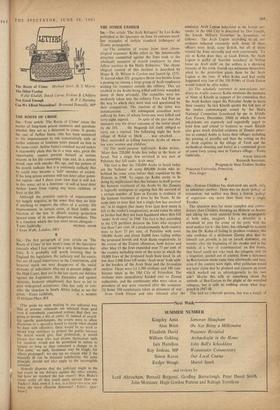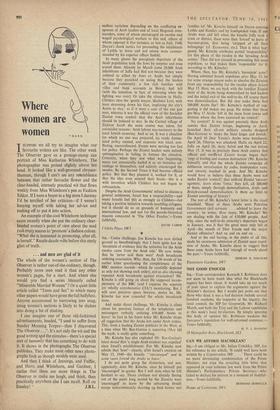Sta,—Erskine Childers has destroyed one myth, only to substitute another.
There was no Arab 'policy' of evacuation; but neither was there a Jewish 'policy' of expulsion—any more than there was a single 'Exodus.'
The situation was far more complex and contra- dictory than Childers, knowing no Hebrew or Arabic and taking his main material from the propaganda of both sides, imagines. Like a detective in a whodunit he pins the crime on the party with the most motive for it—the Jews; but although he accuses the late Dr. Kohn of failing to produce evidence, the only evidence of a deliberate Zionist plan that he himself can provide is (a) an Israeli statement, six months after the beginning of the exodus and in the middle of a 'war of extermination' on five fronts, that Israel could not take back the refugees, and (b) a fragment, quoted out of context, from a statement by Ben-Gurion made some time afterwards; and here, even if the context were right, what politician-would not later claim that he planned and foresaw an event which worked out so advantageously to his own side? Maybe this tells us something about the attitude of Ben-Gurion to the plight of the wretched refugees, but it tells us nothing about what hap- pened in 1947-48.
This had no coherent pattern, but was a tangle of endless variation depending on the conflicting re- sponses of Arab leaders and of local Haganah com- manders, some of whom encouraged an exodus and waged psychological warfare to this end, others of whom opposed it (for instance, as late as July, 1948, Dayan's shock tactics for persuading the inhabitants of Lydda to leave and not return were counter- manded by his superior officer Sadeh).
In many places the precipitate departure of the Arab population took the Jews by surprise and even scared them. Already by March some 20,000 Arab inhabitants of Jaffa had fled not because they were ordered to either by Jews or Arabs but simply because they panicked on seeing that the leaders of their community, a few rich families with villas and bank accounts in Beirut, had left (with the intention, in fact, of returning when the fighting was over). Or take the situation in Haifa. Childers cites the 'gentle mayor, Shabetai Levi, with tears streaming down his face, imploring the city's Arabs to stay,' as if it were a case of the one just man, whereas it was the official view of the Socialist Zionist town council that the Arab inhabitants should bre induced to stay. In the Carmel village of Zichron Jacob the same course was taken, for colonialist reasons : Arab labour was necessary to the local Jewish economy. And so on. It was a situation for which no one was prepared, no ready formu- lated policy existed, and response was local, con- flicting, uncoordinated. Events were moving too fast for policy. Perhaps the Zionist leaders were naively unimaginative in failing to foresee the situation. Certainly, when they saw what was' happening, many not unnaturally hailed it as an immense ad- vantage to themselves, and actively encouraged the exodus. By the Second Truce it had become official policy. But that they planned it, worked for it, or that the idea even entered their heads—this is a wild invention which Childers has not begun to substantiate.
Despite the Arab Governments' refusal to discuss a general settlement, Israel has a responsibility—and many Israelis feel this as strongly as Childers—for taking a positive initiative towards resettling refugees; but it should do so on grounds of humanity and international law, and not for the pseudo-historical reasons concocted in 'The Other Exodus.'—Yours faithfully,



































 Previous page
Previous page